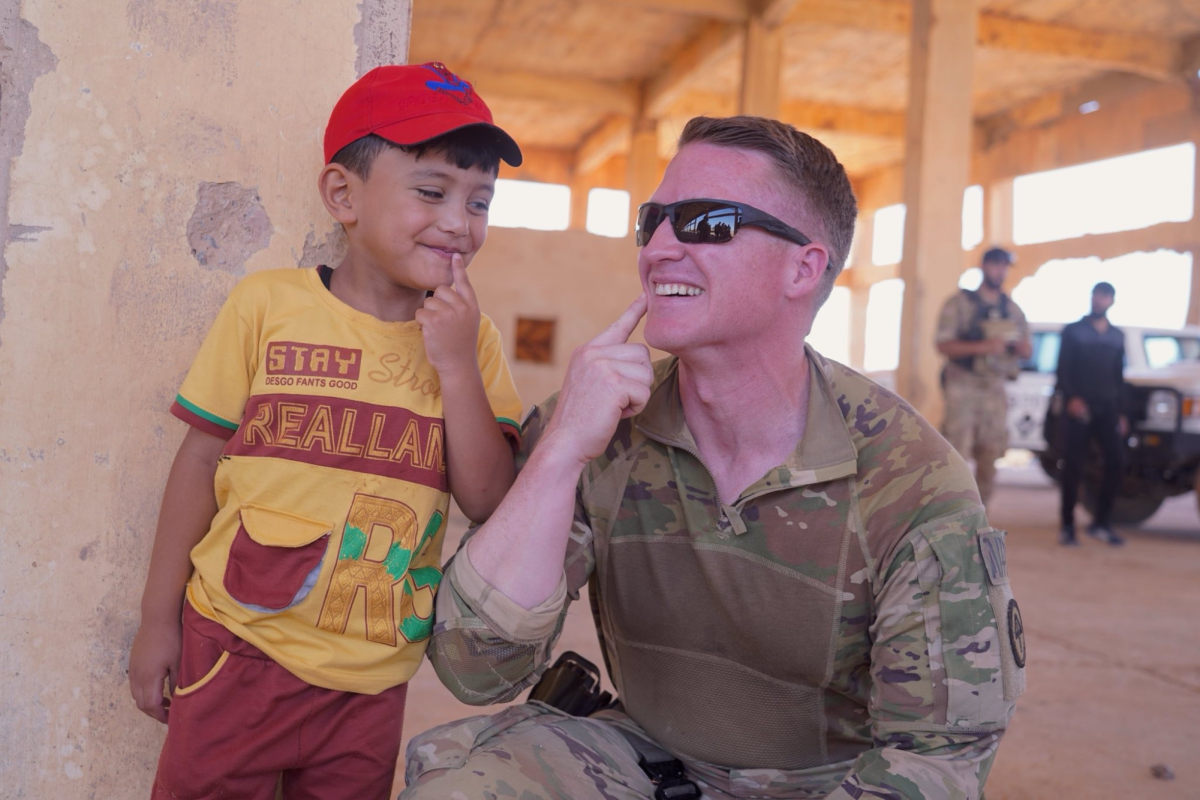In January 2024, around 300 soldiers from the 102nd Cavalry Regiment came together with their loved ones for a farewell ceremony at the Westfield Armory before their deployment to Syria and Iraq. At this time, over 1,500 soldiers were deployed to fight against an Islamic militant group in the Middle East — the New Jersey National Guard’s largest deployment since 2008.
While the squadron was there for a combat deployment as a part of Operation Inherent Resolve to assist the Syrian Free Army, another mission emerged, that to First Lieutenant Jiunn Wu, “had the most profound humanitarian assistance and personal meaning” of all his deployments.
Enlisting while he attended J.P Stevens High School in Edison, NJ, 1LT Wu has been serving in the U.S. Army National Guard for over 18 years. Today, he works as a medical service corps officer serving as the unit executive officer. He has completed multiple domestic missions and four combat tours overseas in Afghanistan, Jordan and, most recently, Syria.
While stationed in Syria, 1LT Wu’s team carried out two main missions. “I was the medical operations officer and my primary responsibility was planning and supporting the medical care, protection and evacuation efforts of all U.S. and coalition forces that come to our U.S. base,” 1LT Wu told Hi’s Eye. The overall goal of these forces was to help counter ISIS influence in the Middle East region.
In 2015, refugees began to gather in a camp named Rubkan on the border of Jordan and Iraq; many of the residents at this displacement camp were families of the fighters with the U.S.-backed Syrian Free Army. They were attempting to flee Islamic state militants and airstrikes by the U.S.-led coalition, Russia and the forces of the former Syrian President Bashar Assad.
During the Syrian Civil War, displacement camps became common, but the conditions in Rukban were especially dire. “The Rukban camp was a makeshift ‘village’ of structures, many predominately mud and rocks and mostly without electricity and lighting unless it existed there from the beginning,” said 1LT Wu.
While being controlled on all sides by Assad’s forces, Jordan sealed its border and stopped providing regular aid deliveries in 2016. The United Nations and other humanitarian agencies were unable to bring aid in. 1LT Wu described it as a ‘siege and starve campaign’ facilitated by the al-Assad Syrian Regime. He added that “the campaign sought to deny any flow of goods, most importantly food, medicine and infant milk formula into the region.”
In an in-person event held in Conway, AR on Aug. 14, Lieutenant Colonel Ryan Harty, former 1-102nd Cavalry Squadron Commander, spoke about the U.S. military’s role in Syria’s Rukban Camp. He explained how friends and family assisted to provide aid. “My soldiers were calling back to their homes and saying that we need baby formula and vitamins,” LTC Harty said. “But these weren’t just supplies. They were reminders. They said to the people of Rukban, ‘You’re not forgotten. Someone sees you, someone cares.’”
According to setf.ngo, there were over 1,000 children in the Rukban Camp deprived of an education. While deployed, 1LT Wu and his fellow soldiers worked together to give these kids an opportunity. “An uneducated population is also a hopeless one,” said 1LT Wu. He added that the soldiers “were able to facilitate passage of school essentials, pencils, notebooks and books to enable basic education in the camp.”
“We saved and brought life into this world in our short time there. What started as a sense of compassion grew [into] a sense of fulfillment,” Wu explained. “It’s hard to put all this into context, but what I return to is that we survived — individually, collectively and morally intact.”


Winnie Petzold • Oct 17, 2025 at 1:34 pm
This story is so well written and makes remember how proud I am to be an American. It also reminds me about the courage and the kindness of our American soldiers. God bless them all. And bless the two young ladies who wrote this story. Winnie Petzold